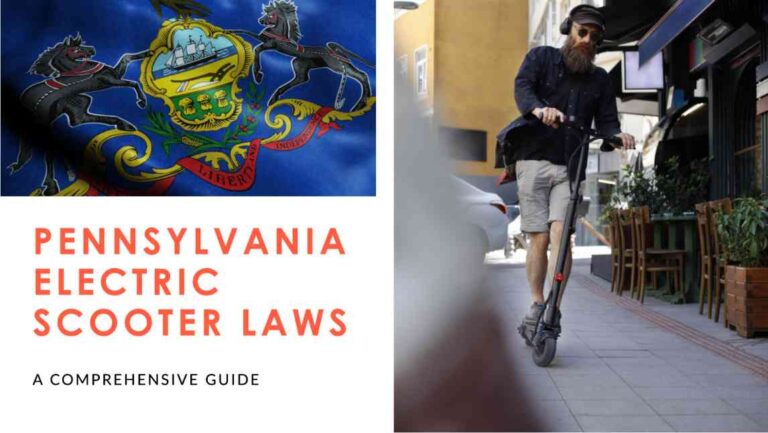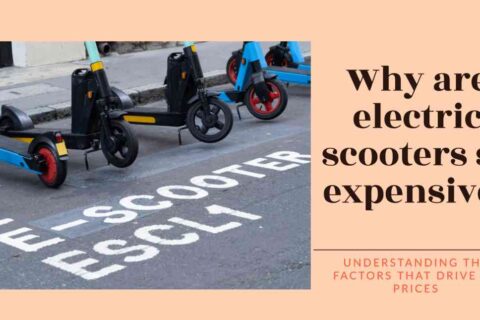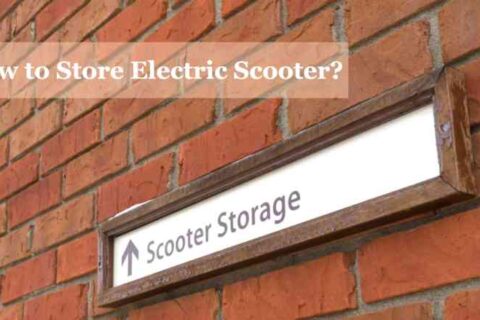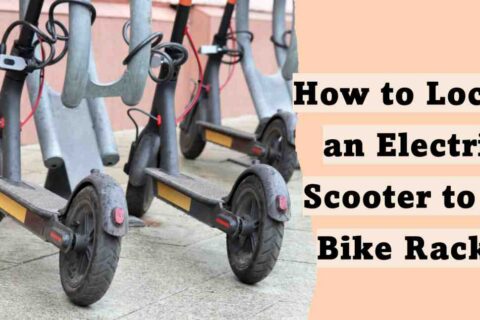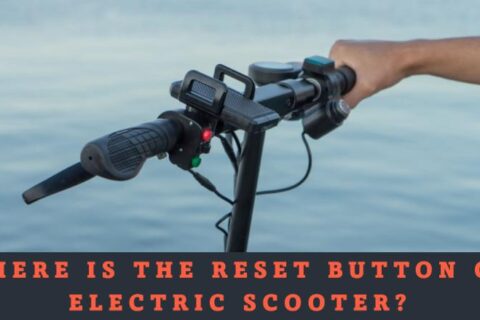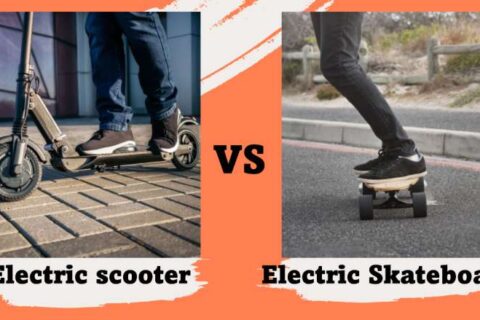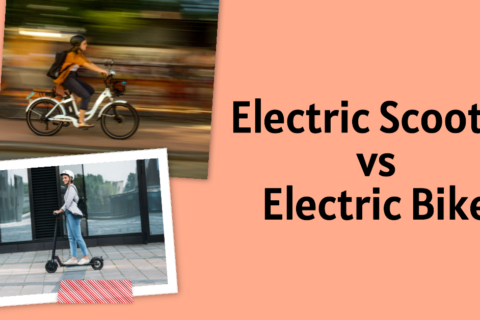Electric scooters are becoming a popular mode of transportation in many cities across the United States. They offer a convenient, affordable, and eco-friendly alternative to cars, buses, and taxis.
However, not all states have the same laws and regulations regarding electric scooters. In this article, we will explore the Pennsylvania electric scooter laws and what you need to know before riding one in the Keystone State.
| Key Takeaways |
|---|
| Legal Requirements: Electric scooters in Pennsylvania are considered “motor-driven cycles” and are subject to the same rules as motorcycles. Liability insurance is mandatory, and scooter registration is required. |
| Licensing and Age: Different license types are required based on the scooter’s engine displacement. Riders must have a Class M motorcycle license for engines over 50 cc and a Class C driver’s license for engines under 50 cc. |
| Safety Measures: Wearing a helmet is crucial, with some exceptions based on age and experience. Scooters must have headlights, taillights, brake lights, turn signals, a horn, rearview mirrors, and fenders. |
| Parking and Storage: Parking guidelines vary; scooters are generally not allowed on sidewalks or roadways. Proper locking and securing of the scooter is necessary to prevent theft or vandalism. |
| Insurance Considerations: Besides liability insurance, optional coverage like collision, comprehensive, medical payments, and uninsured motorist coverage can provide additional protection. |
| Local Regulations: Some Pennsylvania cities have specific ordinances for electric scooter usage, including rules about where scooters are allowed and their speed limits. |
| Penalties and Fines: Non-compliance with scooter laws or local regulations can lead to fines and penalties. These may include fines for driving without a license, registration, insurance, or required safety equipment. |
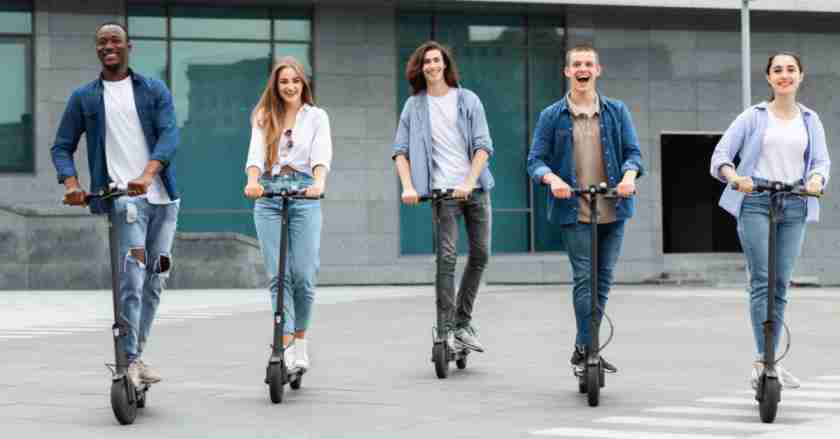
Table of Contents
ToggleUnderstanding Legal Requirements for Electric Scooter Riders
The first thing you need to know is that Pennsylvania does not have a specific law that governs electric scooters. Instead, electric scooters are considered “motor-driven cycles” under the Pennsylvania Vehicle Code. This means that they are subject to the same rules and regulations as motorcycles.
Some of the legal requirements for electric scooter riders in Pennsylvania are:
- You must register and title your electric scooter with the Pennsylvania Department of Transportation (PennDOT). You will need to pay a registration fee and display a license plate on your electric scooter.
- You must have liability insurance for your electric scooter. The minimum coverage required is $15,000 for bodily injury to one person, $30,000 for bodily injury to two or more people and $5,000 for property damage.
- You must equip your electric scooter with the following items: a headlight, a tail light, a brake light, turn signals, a horn, a rearview mirror, and fenders.
- You must inspect your electric scooter annually and obtain an inspection sticker from an authorized inspection station.
Navigating Licensing and Age Restrictions
Lots of folks wonder if they need a license to ride according to Pennsylvania electric scooter laws. The short answer is yes, you do, but it depends on the kind of scooter you’ve got.
- Bigger Engines (Over 50 cc): If your scooter’s engine is bigger than 50 cc, you’ll need a Class M motorcycle license. This means you need to be at least 16 years old and pass a few tests – a written one, a vision one, and a road one. You also have to do a motorcycle safety course that PennDOT approves.
- Smaller Engines (Under 50 cc): For scooters with engines less than 50 cc, you’ll need a Class C driver’s license. You should be at least 16 years old and pass those same tests – written, vision, and road. But you don’t need the motorcycle safety course for this one.
- Out-of-State Licenses: If you’ve already got a valid driver’s license from another state or country, you can use it to ride an electric scooter in Pennsylvania for up to a year. After that, you’ll need to get a Pennsylvania driver’s license.
Now, let’s talk about age limits:
- Bigger Engines: If your scooter’s engine is over 50 cc, you’ve got to be at least 16 years old to ride it.
- Smaller Engines: If your scooter’s engine is under 50 cc, you’ve got to be at least 15 years old to ride it.
But hold up, there’s more: if you’re under 18, no matter what kind of scooter you’ve got, you need a licensed adult with you who’s at least 21 years old.s
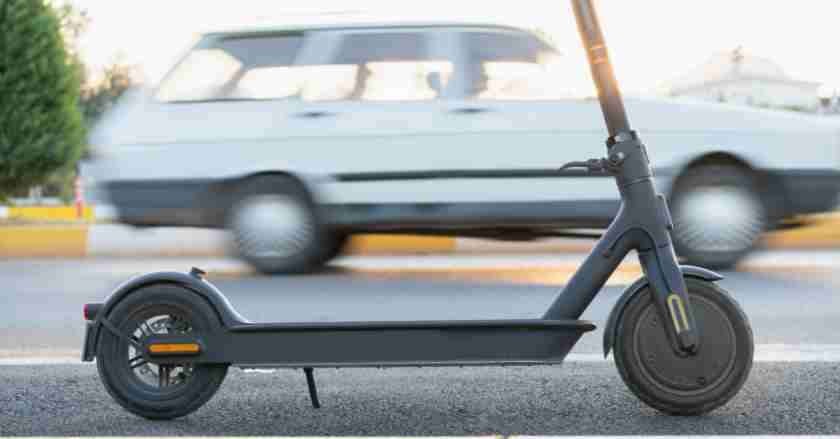
Pennsylvania Electric Scooter Laws on Speed Limit
Pennsylvania does not have a specific speed limit law for electric scooters. Instead, electric scooters are considered “motor-driven cycles” that are subject to the same rules and regulations as motorcycles.
This means that electric scooters must be able to reach the minimum speed limit of 25 miles per hour (mph) on most roads.
However, most electric scooters are not designed to meet this requirement and may not be able to go faster than 15-20 mph. Therefore, electric scooters are effectively banned in Pennsylvania and cannot be legally operated on public roadways.
Pennsylvania Electric Scooter Laws on Safety: Helmets, Lights and Reflectors
Staying safe on your electric scooter in Pennsylvania is super important.
First up, wearing a helmet is a big deal. According to Pennsylvania’s Vehicle Code, if you’re on a motor-driven cycle (like an electric scooter), you have to wear a helmet.
It should be protective and meet the standards set by PennDOT. This rule goes for both the person driving the scooter and any passengers.
But there are a couple of times you don’t have to wear a helmet. If you’re 21 or older and have ridden for two years or finished a motorcycle safety course approved by PennDOT, you’re good to go without a helmet.
Also, if you’re riding in a covered cab or on a three-wheeled ride with a windshield and roof, no helmet is needed.
Next, your scooter needs to be lit up right. The Vehicle Code says all motor-driven cycles need at least one headlight that can light up at least 100 feet ahead, a tail light that’s visible from 500 feet away, a brake light that’s seen from 100 feet, and two turn signals that can be spotted from 300 feet.
You also need to have a rearview mirror to see behind you and a horn that people can hear from at least 200 feet away. Stick some reflectors on the front, back, and sides of your scooter – they need to be seen from 600 feet when another vehicle’s headlights hit them.
Parking and Storage Guidelines for Electric Scooters
According to the Pennsylvania Vehicle Code, sidewalks aren’t cool spots to park your scooter unless the local rules say it’s okay, or you’re doing it to avoid messing up traffic. And putting it on a road isn’t a great idea either unless you have to because of an emergency or your scooter broke down.
If there’s a parking space set aside for motorcycles or bikes, that’s where you can park your scooter – just make sure you only take up one space and don’t get in anyone’s way.
Regular parking spaces for cars are okay too, but you’ll need to pay like everyone else and play by the parking rules.
When you’re parking, always lock up your scooter and take the key. Use something like a chain or cable to tie it to a fixed thing like a pole or fence – this keeps it safe from being taken or messed with.
Storing your scooter is pretty much the same as parking. No sidewalks or roads unless the local rules allow it or you’re dealing with an emergency or breakdown.
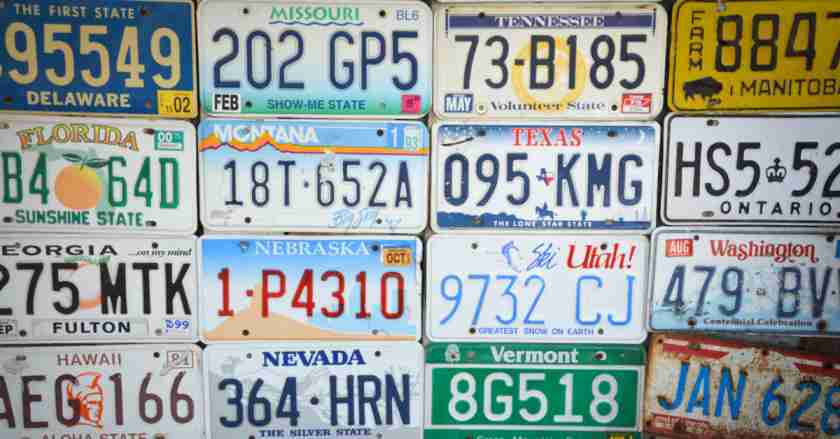
City-specific Regulations for Pennsylvania electric scooter laws
Even though there’s no special law for electric scooters in all of Pennsylvania, some cities in the state might have their own rules for scooter riders.
Here are some examples:
Philadelphia: In Philly, electric scooters can’t go on sidewalks, bike lanes, or trails. They’re okay on streets where the speed limit is 25 mph or less. Scooter riders should follow bicycle rules and be careful around pedestrians. Scooters can’t go faster than 15 mph and can’t weigh more than 100 pounds.
Pittsburgh: Over in Pittsburgh, scooters can roll on sidewalks, bike lanes, and trails, as long as they don’t bother pedestrians or others using those paths. Just like in Philly, scooter riders need to follow bicycle rules and give way to pedestrians. Speed should stay under 15 mph, and scooters shouldn’t weigh more than 100 pounds.
Harrisburg: In Harrisburg, scooters are cool on sidewalks, bike lanes, and trails as long as they don’t get in the way of pedestrians and others. Following bicycle rules and showing courtesy to pedestrians is a must. Scooters here can go up to 20 mph and should stay under 100 pounds in weight.
Potential Penalties in Pennsylvania electric scooter laws
If you don’t follow the rules laid out by Pennsylvania electric scooter laws or the local rules, you could land in trouble with fines and penalties. Here’s what you could face:
- No License: If you’re caught riding an electric scooter without a valid license, you might have to pay a fine of up to $200.
- No Registration: Riding without proper registration can get you a fine of up to $300.
- No Insurance: Riding without the right insurance can also bring a fine of up to $300. You might even lose your scooter’s registration and your driver’s license for three months.
- No Inspection: Skipping the yearly inspection might mean a fine of up to $25.
- No Helmet: If you or your passenger aren’t wearing a helmet, you could be fined up to $25.
- No Lights or Reflectors: Not having the right lights or reflectors on your scooter might cost you up to $25.
- Wrong Places: If you’re riding where you’re not supposed to, like sidewalks, bike lanes, trails, or certain roads you could be slapped with a fine of up to $25. The police might even take away your scooter.
- Reckless Riding: If you’re not riding safely and you’re putting yourself or others in danger, you might be looking at a fine of up to $200. You might also end up facing more serious charges for reckless driving.
These are just some of the possible fines and penalties if you don’t stick to Pennsylvania’s electric scooter rules or the local ones.
Sidewalks, Bike Lanes, and Roads Rules in Pennsylvania
Apart from sticking to the rules, it’s good to know some simple manners when you’re out and about on your electric scooter in Pennsylvania. This keeps things smooth and avoids any issues with other people on the road or walking around. Here are some basic tips:
Sidewalks:
You’re allowed to scoot on sidewalks, remember that pedestrians come first. Go nice and slow, not faster than folks walking. Give them space, and give them a little heads-up if you’re passing by. Keep away from busy sidewalks and spots like schools and hospitals.
Bike Lanes:
bike lanes are your go-to, go with the flow of traffic. Stay on the right side and make room for other bike riders to pass you. Use hand signals to show when you’re turning or changing lanes. Stick to bike lanes that everyone can use and avoid ones meant only for bicycles or that go against the usual traffic direction.
Roads:
If roads are your thing, act like you’re in a car. Stay on the right side and follow the same traffic signs and lights. Signal before turning or switching lanes, just like drivers do. Keep away from roads where the speed limit is over 25 mph or where motorized cycles like scooters aren’t allowed.
Remember, these are just some easy tips to keep things friendly and safe when you’re zipping around on your electric scooter in Pennsylvania.
Recent Updates in Pennsylvania Electric Scooter Laws
As more and more people in Pennsylvania are getting into electric scooters, the state and local authorities might change the rules to fit them in. So, it’s super important to keep up-to-date with what’s going on in Pennsylvania electric scooter laws.
Here are some things that have happened recently:
- Back in 2021, PennDOT (Pennsylvania Department of Transportation) kicked off a test program. They wanted to see how well shared electric scooters work in six cities like Harrisburg, Lancaster, and others. The program goes on for a year, and they’re gathering info from folks who use the scooters, the companies that run them, and other important people.
- In 2020, the City Council in Philadelphia said “yes” to electric scooters. They made a rule that up to 10,000 shared scooters can roll around Philly. To keep things in line, they set up a system where the Philly Parking Authority takes care of who gets to do what.
- In 2019, Pittsburgh jumped on the scooter train too. The City Council there passed a law that said up to 1,500 shared electric scooters can zip around Pittsburgh. Just like in Philly, there are rules for how they’re used, where they go, and how to be safe.
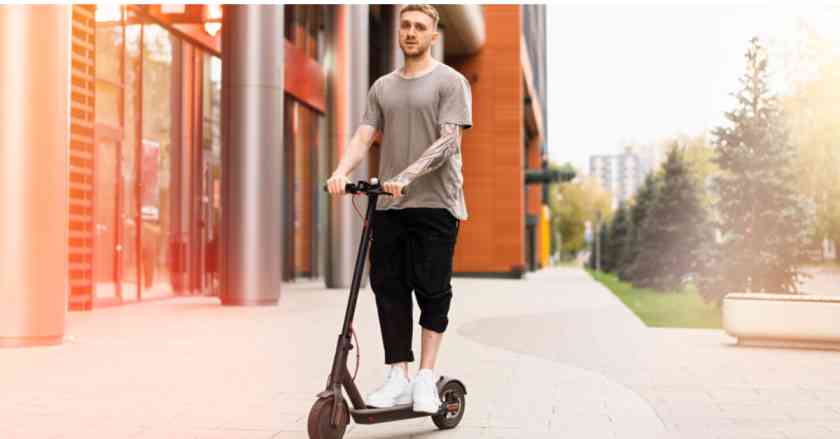
Frequently Asked Questions (FAQs)
Do I need insurance for my electric scooter in Pennsylvania?
Yes, you need liability insurance for your electric scooter. If you ride without insurance, you could face fines, suspension of registration and driver’s license, or other penalties.
Can I park my electric scooter anywhere in Pennsylvania?
No, you can’t park your electric scooter just anywhere. Follow parking rules for motorcycles and bicycles. Avoid blocking pedestrian paths and make sure not to occupy multiple spaces.
Are there city-specific rules for electric scooter usage in Pennsylvania?
Yes, some cities like Philadelphia, Pittsburgh, and Harrisburg have their own regulations for electric scooters. These rules may cover where you can ride, speed limits, and more. Always check local ordinances before riding.
Can I use my out-of-state driver’s license to ride an electric scooter in Pennsylvania?
Yes, you can use an out-of-state driver’s license for up to one year. After that, you should apply for a Pennsylvania driver’s license.
Do I need to wear a helmet if I’m riding an electric scooter with a passenger?
Yes, both the rider and the passenger are required to wear helmets while on an electric scooter in Pennsylvania.
Are electric scooters subject to DUI laws in Pennsylvania?
Yes, if you’re riding under the influence of drugs or alcohol, you can be charged with a DUI just like if you were driving a car.
Can I carry passengers on my electric scooter in Pennsylvania?
Yes, you can carry passengers on your electric scooter as long as it’s designed to carry two people and has proper seating.
Are there restrictions on the type of roads where electric scooters are allowed in Pennsylvania?
Yes, Pennsylvania Electric Scooter Laws are generally not allowed on roads with speed limits over 25 mph, and some local ordinances may have additional restrictions.
Conclusion
These are just some examples of recent updates in Pennsylvania electric scooter laws. You should always stay informed and updated about any changes or developments in the Pennsylvania electric scooter laws.
I hope you found this article helpful and informative. If you have any questions or comments, please feel free to share them with me. I would love to hear your feedback and opinions on the Pennsylvania electric scooter laws.

